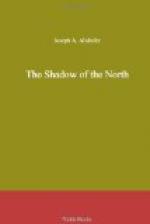Willet, who had come in, smiled.
“Don’t let ’em make game of you, Mr. Wilton,” he said, “but there’s truth in what Robert tells you. He understands Tayoga so thoroughly that he knows pretty well what he’ll do in every crisis.”
After the Onondaga had eaten he wrapped himself in blankets, went to sleep in one of the rooms of the blockhouse and slept twenty-four hours. When he awoke he showed no signs of his tremendous journey and infinite dangers. He was once more the lithe and powerful Tayoga of the Clan of the Bear, of the nation Onondaga of the great League of the Hodenosaunee.
The besiegers meanwhile undertook no movement, but, as if in defiance, they increased the fires in the red ring around the fort and they showed themselves ostentatiously. Robert several times saw De Courcelles with a thick bandage about his head, and he knew that the Frenchman’s mortification and rage at being tricked so by the Onondaga must be intense.
Now the weather began to grow very cold again, and Robert saw the number of tepees in the forest increase. The Indians, not content with the fires, were providing themselves with good shelters, and to every one it indicated a long siege. There was neither snow, nor hail, but clear, bitter, intense cold, and again the timbers of the blockhouse and outbuildings popped as they contracted under the lower temperature.
The horses were pretty well sheltered from the cold, and Willet, with his usual foresight, had suggested before the siege closed in that a great deal of grass be cut for them, though should the French and Indians hang on for a month or two, they would certainly become a problem. Food for the men would last indefinitely, but a time might arrive when none would be left for the horses.
“If the pinch comes,” said Willet, “we know how to relieve it.”
“How?” asked Colden.
“We’ll eat the horses.”
Colden made a wry face.
“It’s often been done in Europe,” said the hunter. “At the famous sieges of Leyden and Haarlem, when the Dutch held out so long against the Spanish, they’d have been glad enough to have had horseflesh.”
“I look ahead again,” said Robert, hiding a humorous gleam in his eyes from Colden, “and I see a number of young men behind a palisade which they have held gallantly for months. They come mostly from Philadelphia and they call themselves Quakers. They are thin, awfully thin, terribly thin, so thin that there is scarcely enough to make a circle for their belts. They have not eaten for four days, and they are about to kill their last horse. When he is gone they will have to live on fresh air and scenery.”
“Now I know Lennox that you’re drawing on your imagination and that you’re a false prophet,” said Colden.
“I hope my prediction won’t come true, and I don’t believe it will,” said Robert cheerfully.
Several nights later when there was no moon, and no stars, Willet and Tayoga slipped out of the fort. Colden was much opposed to their going, fearing for their lives, and knowing, too, how great a loss they would be if they were taken or slain, but the hunter and the Onondaga showed the utmost confidence, assuring him they would return in safety.




